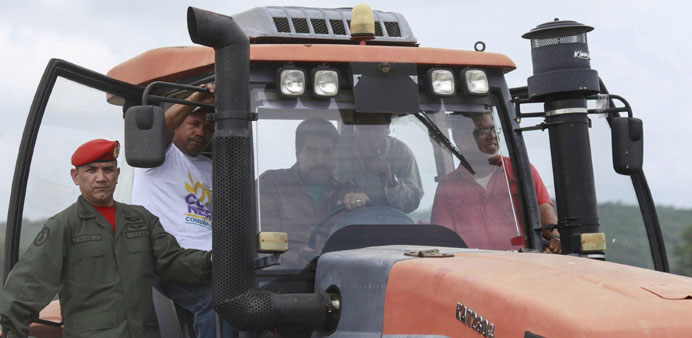President Nicolas Maduro drives a tractor, during his visit to a corn plantation in the state of Cojedes.
Reuters/Maracaibo
As dawn breaks over the scorching Venezuelan city of Maracaibo, smugglers, young mothers and a handful of kids stir outside a supermarket where they spent the night, hoping to be first in line for scarce rice, milk or whatever may be available.
Some of the people in line are half-asleep on flattened cardboard boxes, others are drinking coffee. Almost all are bemoaning their situation.
With shortages of basic goods and looting on the rise, more Venezuelans say they are resorting to nighttime waits in front of closed stores.
“I can’t get milk for my child. What are we going to do?” said Leida Silva, 54, breaking into tears outside the Latino supermarket in northern Maracaibo where she arrived at 3am on a recent day.
The food shortages in Venezuela, a major oil producer, stem from currency controls that restrict the availability of US dollars for imports. Lower oil prices, a recession and rampant inflation have further darkened the economic outlook.
The information ministry did not respond to requests for comment.
There have been scores of looting attempts this year, fueling fears of worsening scarcity. Several states banned nighttime queues earlier this year, at times citing problems with crime.
“I’m scared, of course, but it’s the only way we can eat,” said Ofenia Gonzalez, 46, spending the night outside a supermarket in the hopes of finding food for her nine children.
Soldiers with riot shields, tear gas canisters and rifles patrol lines in Maracaibo, a major city in the northwest.
Scarcity is particularly acute here because smugglers - taking advantage of the leftist government’s policy of fixing prices on some goods - buy products to sell for profit in nearby Colombia.
“We have to maintain control otherwise there would be chaos,” said lieutenant Carlos Barrera, 21, pushing back crowds at one supermarket.
Smugglers known as “bachaqueros,” after a large leaf-cutter ant, are ubiquitous in nighttime queues. Working in groups, they swarm stores when goods arrive.
Some of those waiting in line in Maracaibo readily identified themselves to Reuters as smugglers.
President Nicolas Maduro, saying smugglers are depriving the poor, has vowed another crackdown. “What’s a bachaquero?” he said during a speech on Tuesday. “It’s a human being turned savage.”
While there is resentment towards resellers in queues, more than 60% of Venezuelans blame shortages on the government, according to pollster Datanalisis.
“We want change. We need this government to collapse,” said Yanet Moran, 19, after five hours queuing in the dark.
Venezuelan President Nicolas Maduro’s popularity fell to 24.3% in July, hurt by the voracious inflation and shortages of goods ranging from spare parts to shampoo, according to respected local pollster Datanalisis.
Maduro, who narrowly won an election to replace late leader Hugo Chavez in 2013, has avoided the structural reforms economists say are crucial to keep conditions from worsening.
About 24.3% of those surveyed gave positive evaluations to the former bus driver and union leader’s governance, down from 25.8 in May, the latest Datanalisis survey shows.
Negative evaluations climbed to 70.4 from 68.8%.
Several Latin America presidents, including Brazil’s Dilma Rousseff and Peru’s Ollanta Humala, have even lower approval ratings.
Maduro, who lacks favorable oil prices and Chavez’s charisma, is gearing up for the December 6 parliamentary election in which the political opposition has its best shot in years at winning the National Assembly.
Only 19.2% would vote for candidates from the ruling Socialist Party if the election were held this Sunday, versus 42.2% for the opposition, according to the poll.
However, 17.5% said they did not know or would not answer.
While support for Maduro has tumbled, especially in poor areas hit hard by price increases and scarcity, a fragmented and elite-dominated opposition has yet to capitalize on the discontent.
About 82.2% of Venezuelans surveyed described the current economic situation as negative, with 65.5% saying inflation was making it impossible for their households to make ends meet.
The central bank has not published 2015 consumer price data, but economists say annual inflation has topped 100%.
Costs of certain goods rise on a weekly basis, and daily conversations among Venezuelans often turn to shocking price increases.
Despite the mounting economic woes, 75.6% of those surveyed said they were not willing to protest in marches.
Last year’s massive anti-government demonstrations led to more than 40 deaths on both sides, and many moderates in the opposition said they were premature and counterproductive.
Opinion polls in Venezuela are divergent and controversial, but Datanalisis is one of the most closely watched and respected.
Datanalisis interviewed 999 people between July 10-23 and said the survey was 95 percent reliable.

